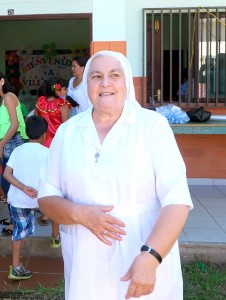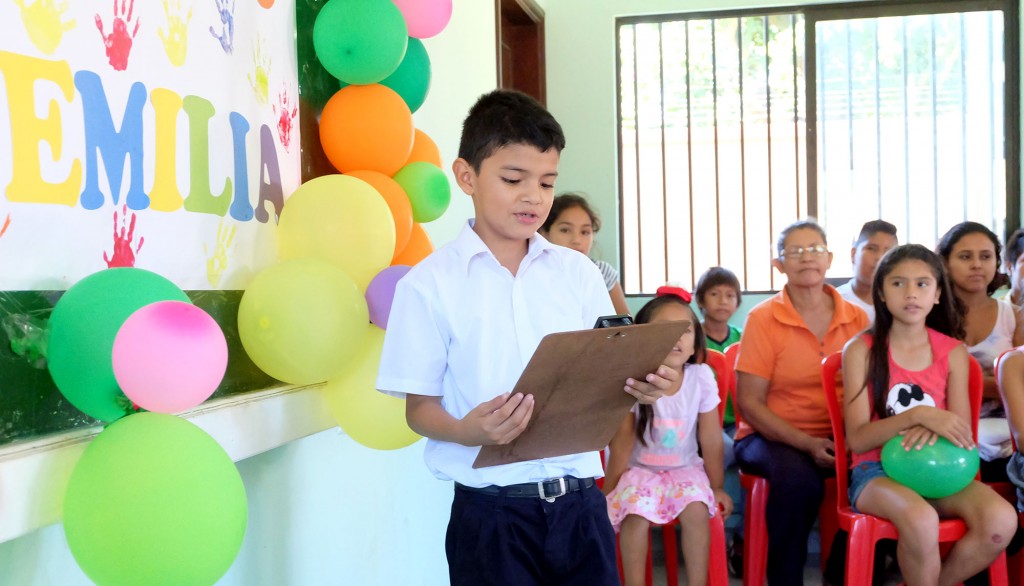A positive role model can make all the difference. Single mothers in Santa Cruz, Bolivia are finding that out, and so are the children who look up to them.

Sister Pilar
Hidden behind the popular tourist destinations and modern attractions of Santa Cruz lurks the shadow side, where many children knew nothing but homelessness, poverty and crime–until Sister Pilar showed up.
Sister Pilar and her fellow nuns at Villa Emilia regularly venture into the darkest sides of Santa Cruz to find and talk to women working on the streets. These women, mostly single mothers, struggle to keep their families intact and their children fed – a task that is always difficult, dangerous and often illegal.
But those who cross paths with Sister Pilar find not only help, but a new way of life. The nuns provide a safe, temporary home for the women and their children on a spacious, beautiful compound where they learn job and child rearing skills.
The environment and help offered at Villa Emilia provides a lifeline for the families. More importantly, however, it provides positive role models for the women, allowing them to become positive role models for their own children, thus breaking the generational cycle of poverty, homelessness and crime.
A beacon in the dark
At the heart of the project is Sister Pilar, a 75-year-old nun from Spain, who has devoted her life to helping the poor regardless of their background or beliefs. Her primary focus is to provide concrete support to the women and children under her care.
“It doesn’t matter which religion you believe in, as long as you help the poor.”
– Sister Pilar
More than 70 children are in the Villa Emilia program, and Sister Pilar takes care of them all, along with their mothers. The women are trained in garment-making with the expectation that they’ll later be employed in the large industrial garment industry in Bolivia. For the time being, however, they work in a garment factory managed by the sisters of Villa Emilia. There they learn not only technical know-how, but also work ethic and workplace skills that will help them succeed – and that they’ll later pass on to their own children.
During their stay at Villa Emilia, the women learn to look up to and trust Sister Pilar, and they work hard to prove themselves and to “graduate” from the transitional program. Their children do as well – they attend school and are tutored by Sister Pilar, learning from the nuns and from their mothers to work hard to succeed. The results are measurable — an unusually high percentage of the Villa Emilia children are at the top of their classes at school.
A stable future
Once the families are ready, they transition into permanent housing. The homes are initially owned by the sisters, but the women buy them for their own, using their wages to pay the mortgages and thus learning about budgeting and homeownership – more lessons they pass on to their children.
Once in their new homes, some of the women stay on working at the sisters’ factory, while others land jobs on the outside. Either way, they become the proud owners of small, modern houses built close together on a large, subdivided plot. The neighborhood allows the families, who have become friends and colleagues, to stay together in schools, commuter buses and workplaces.
Sister Pilar and her volunteers have purchased nine more plots of land for new homes. Roberto Andrade, who oversaw the Montero school expansion, will oversee the construction plans for the additional houses. Once an impoverished Bolivian child himself, Andrade is now an architect and a regular volunteer on the Children Incorporated team, living proof that sometimes all you need is a chance to become a role model for change.
***
HOW DO I SPONSOR A CHILD IN BOLIVIA?
You can sponsor a child in Bolivia in one of three ways – call our office and speak with one of our sponsorship specialists at 1-800-538-5381, email us at sponsorship@children-inc.org, or go online to our donation portal, create an account, and search for a child in Bolivia that is available for sponsorship.

